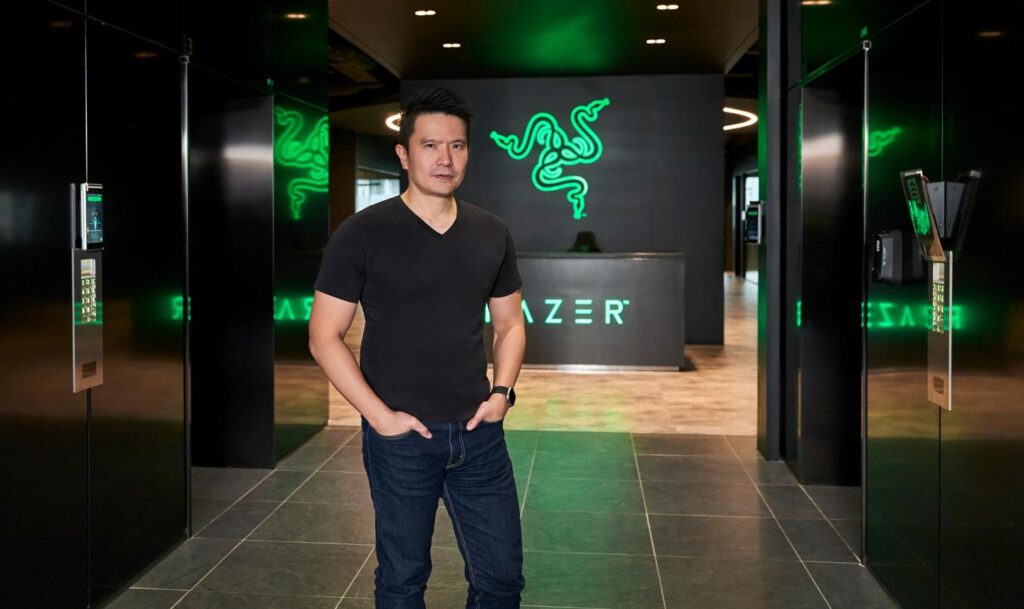
Razer CEO Min-Liang Tan, alongside Josephine Teo, Singapore’s Minister for Digital Development and Information, recently inaugurated Razer’s AI Centre of Excellence. This event marks a significant step for the gaming hardware giant as it ventures into artificial intelligence (AI), aiming to revolutionize the gaming industry. The announcement comes amid Forbes’ coverage of Singapore’s Richest 2025, highlighting Razer’s strategic pivot.
At Razer’s $75 million regional headquarters in Singapore, a striking black building with a neon green logo, the company is intensifying its focus on AI software tools. On a typical August morning, two members of Razer’s nascent AI team demonstrated new gaming software, showcasing the potential of AI in enhancing gaming experiences. Despite the simplicity of the setup, the demonstration highlighted the potential of Razer’s QA Co-AI and Game Co-AI tools to transform game development and player engagement.
Razer’s Strategic Pivot to AI
Razer’s investment in AI comes at a time when the gaming hardware market faces challenges such as rising costs and inflation-affected consumer spending. According to PitchBook’s senior research gaming analyst Eric Bellomo, these factors are squeezing hardware developers, who previously weathered economic downturns unscathed. In contrast, the AI game development market is projected to grow significantly, from $2.3 billion in 2023 to $28 billion by 2033, according to Market.US.
Min-Liang Tan, Razer’s chairman and CEO, is confident that AI will disrupt the gaming industry, positioning Razer at the forefront of this transformation. The company’s QA Co-AI tool, set to launch later this year, aims to streamline game development by providing developers with robust performance-related software. Meanwhile, Game Co-AI, currently in beta testing, offers real-time coaching to enhance player skills.
Unlocking New Revenue Streams
Razer’s shift towards AI is not just about innovation; it’s also a strategic move to unlock new revenue streams. The $42 billion gaming hardware market, which constitutes about 90% of Razer’s sales, is experiencing sluggish growth. By contrast, AI tools offer a promising avenue for expansion. Loo Wee Teck, a global insight manager at Euromonitor International, suggests that Razer’s pivot could transform it from a hardware-centric company to a software services platform.
“We believe that AI gaming is going to completely disrupt all of the game industry. And we want to be at the forefront of it.”
Razer’s investors, including CVC Capital Partners, are optimistic about the potential of AI to boost earnings and increase Razer’s valuation. The company went private in a $3.2 billion deal three years ago, but there are aspirations to go public again, leveraging AI advancements as a catalyst for growth.
Challenges and Competitive Landscape
Despite the promising outlook, Razer faces significant competition in the AI gaming tools space. Established players like Unity Technologies and Keyword Studios dominate game testing, while companies like GGWP and Mobalytics excel in player coaching. In Asia, Tencent and Krafton are leveraging AI to enhance game development and player experiences.
Razer’s challenge is to catch up and carve out a niche in this competitive landscape. The company’s private status allows for bold investments, with Tan emphasizing that much of the AI strategy is funded from Razer’s balance sheet. The company generates $1 billion in annual sales, with its software suite boasting over 200 million users. However, recent financial data from Singapore shows a significant drop in net profit, highlighting the need for successful AI integration.
Razer’s Historical Innovations
Razer’s journey from a hardware-focused company to a potential AI powerhouse is rooted in its history of innovation. Founded in 2005, Razer quickly established itself as a leader in gaming peripherals, competing with giants like Logitech and Corsair. The launch of Razer Synapse in 2006 marked its first foray into cloud gaming, laying the groundwork for future software developments.
Over the years, Razer has ventured into various sectors, including fintech and digital banking, with mixed success. Its current focus on AI tools reflects a strategic shift towards leveraging its gaming expertise to drive software innovation.
The Future of AI in Gaming
Razer’s AI tools are designed to enhance both game development and player experiences. QA Co-AI aims to streamline the testing phase, identifying bugs more efficiently and reducing production costs. Game Co-AI, on the other hand, offers players real-time coaching, drawing on datasets from elite esports players.
“No one really talks about QA, but it’s such an important part of game development.”
Razer’s AI strategy involves a global expansion, with plans to hire 150 AI specialists in Singapore and establish AI hubs in Europe and the U.S. This expansion is supported by the Singapore government, highlighting the strategic importance of AI in Razer’s future.
As Razer continues to innovate, Tan envisions AI game revenues becoming a significant part of the company’s income. The potential for AI to increase productivity and free up time for gaming underscores the transformative impact of these tools on the industry.
With additional reporting by Jessica Tan, this story was originally published on forbes.com. All figures are in USD.






